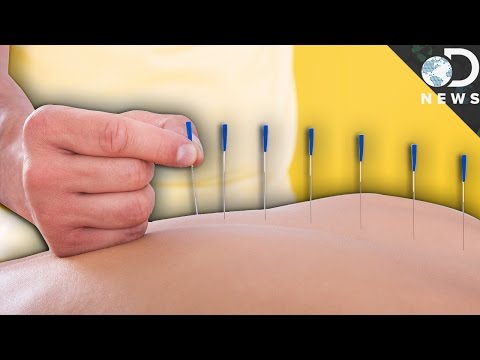Scientifically when it comes to acupuncture, it’s hard to see the point. Hello everyone, Julian here for DNews. Acupuncture is the practice of pricking skin or tissue with fine needles; it’s usually used for pain relief although it’s claimed to have a plethora of other benefits. The first definitive description of acupuncture is from China over 2000 years ago. and at the time it was believed that illness was caused when life force, known as qi, couldn’t properly flow through the body. Or when the two forms of qi, yin and yang, were out of balance. Prodding certain points would clear the blockages and restore the flow of qi, causing the illness to subside. If this sounds silly to you, remember that around the same time in the western world we had a similar theory about the imbalance of “humors,” and doctors used to think people were sick because they had just too much of this blood stuff and it needed to come out.
But while bloodletting went out of style around the same time as child labor, acupuncture has been making a comeback since the 1950s as a tool for pain relief. It’s also used to treat depression, irritable bowel syndrome, rheumatoid arthritis, smoking addiction, chronic asthma, stroke rehabilitation, epilepsy, insomnia, morning sickness, and glaucoma, high blood pressure, low blood pressure, even colorblindness! Protip: if something claims to treat all of these ailments, that might be a red flag. Whether or not acupuncture works is controversial, and part of the problem is that it is inherently difficult to study scientifically.
Some factors like the soothing nature of the acupuncture room are easy to control for: just turn up the lights and cut out the Careless Whisper. But the act of putting in the needle itself causes headaches for researchers. If the researchers know if the treatment is a placebo, it can affect their results. So, scientists have developed a sort of stealth needle to overcome this problem. It’s concealed in a sheath, and either goes in all the way or only pokes the surface. The goal is for the patient to believe the needle is in, and the researcher won’t know one way or the other. But even with these sham needles and with a plethora of research, there is still considerable debate.
A 2003 World Health Organization review of multiple acupuncture studies showed oodles of positive results. This review, however, omitted trials were sham acupuncture and the real thing had similar effects. Plus, a majority of the studies were published in Asian journals, and as Andrew Vickers of the Research Council for Complementary Medicine pointed out in a different review of acupuncture studies, “all trials originating in China, Japan, Hong Kong, and Taiwan were positive.” By comparison 53% of reviewed trials in the US favored the treatment.
More recent reviews have debunked acupuncture. A 2006 meta analysis published by the Journal of Internal Medicine found that the results of acupuncture treatment couldn’t be differentiated from the placebo. A 2010 meta analysis of meta analyses (that’s so meta) in the Journal of the International Association for the Study of Pain concluded there was little evidence supporting acupuncture as an effective form of pain relief. But in 2012, a meta analysis out of the Memorial Sloan Kettering Cancer Center – authored by that same Vickers guy from earlier – came out in favor of acupuncture, finding it had an effect greater than the placebo, but conceded it was “relatively modest.” Now this is the point where I’d normally conclude more research is needed, but this time I’m not so sure. There have been over 3,000 trials on acupuncture there’s still no conclusive evidence that being poked with needles alone reduces pain or other ailments in a significant way.
I’ll… let you draw your own conclusions. Even if Acupuncture doesn’t have a positive effect, at worst it’s usually harmless. The same can’t be said for homeopathy. To learn more about this alternative “medicine,” check out Julia’s video here. Have you ever been acupunctured? Did it help with anything? Do you think it was the placebo effect?.
